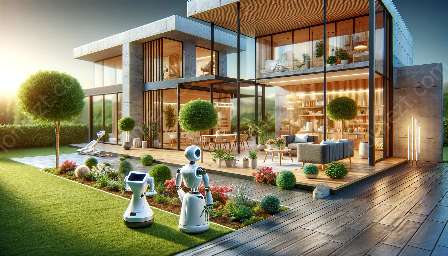Robotic kitchen assistants have rapidly advanced in recent years, ushering in a new era of automated culinary experiences for homeowners around the world. These technological marvels promise to revolutionize the way we interact with our kitchens, offering convenience, efficiency, and futuristic sophistication. This article explores the latest innovations in robotic kitchen assistants, their seamless integration into home automation, and their profound impact on intelligent home design.
The Evolution of Robotic Kitchen Assistants
Advancements in robotics and artificial intelligence (AI) have fueled the development of intelligent kitchen assistants capable of performing a wide range of tasks. From meal preparation and cooking to cleaning and organizing, these robots are designed to streamline the kitchen workflow and take mundane chores off the hands of homeowners. By leveraging cutting-edge technologies such as machine learning and computer vision, these assistants are able to adapt to diverse culinary needs and preferences, making them indispensable assets in modern households.
Application of Robotics in Home Automation
The integration of robotic kitchen assistants into home automation systems presents a seamless and intuitive approach to managing domestic tasks. Through smart connectivity and interoperability, these robots can coordinate with other automated devices and platforms within the home environment. This enables users to orchestrate complex culinary routines, monitor food inventory, and synchronize cooking processes with their overall lifestyle. Moreover, the synergy between robotic kitchen assistants and home automation systems contributes to energy efficiency, waste reduction, and enhanced safety measures, aligning with the principles of sustainable living and smart home design.
Intelligent Home Design and Robotic Kitchen Assistants
The emergence of robotic kitchen assistants has transformed the conventional notions of home design, influencing spatial layouts and functional configurations. Architects and interior designers are now incorporating dedicated spaces and integrated infrastructure to accommodate these futuristic appliances, optimizing ergonomics and operational flow within the kitchen environment. Furthermore, the aesthetic appeal and sleek design of robotic kitchen assistants align with the modern, minimalist sensibilities of intelligent home design, creating a harmonious fusion of technology and sophistication.
Future Implications and Benefits
As the field of robotics continues to evolve, the potential benefits of robotic kitchen assistants are poised to expand. From personalized meal planning and nutritional guidance to collaborative cooking experiences and interactive recipe libraries, these innovations are set to redefine culinary culture and transform the domestic landscape. Additionally, the accessibility and affordability of robotic kitchen assistants may democratize gourmet dining experiences, making them accessible to a wider spectrum of homeowners.
Conclusion
The innovations in robotic kitchen assistants present an exciting convergence of technology, home automation, and intelligent design, reshaping the way we envision and interact with our living spaces. As these advanced appliances continue to evolve, they hold the power to enhance our daily lives, redefine domestic dynamics, and inspire a new era of culinary creativity.


